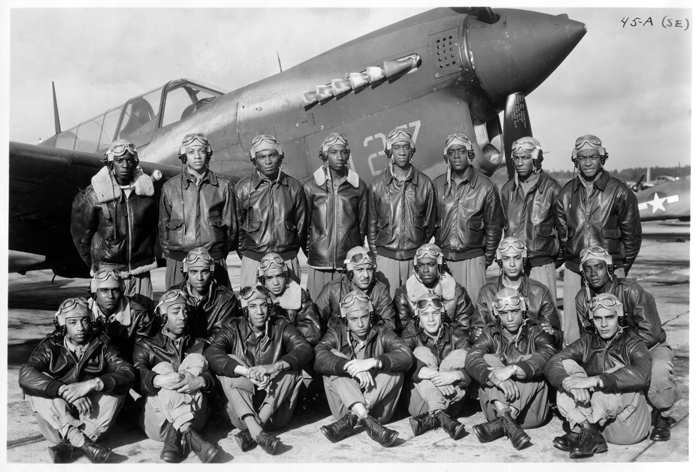In September, 1941, President Franklin D. Roosevelt set in motion a highly controversial experiment. The “experiment” was the training of African American’s to be military aviators.
The men who took part in this experiment would go on to form the 99th Fighter Squadron, one of the more efficient and successful squadron’s during WWII.
At the time of President Roosevelt’s decision, the Tuskegee Army Air Field in Tuskegee, Alabama was under construction. The air base was located at the renowned Tuskegee Institute that had been founded by Booker T. Washington.
The first instructor on the base to train the future aviators was Lt. Col. Noel F. Parrish. His first aviation class began in July 1941 and consisted of 13 cadets, only 5 would graduate. However, by the end of the war, nine hundred and ninety-two pilots would graduate. Many serving with distinction.
The 99th Fighter Squadron earned quite a reputation for their tremendous success at escorting bombers on their missions. According to the Tuskegee Airmen National Historical Museum, the squadron was able to conduct 200 out of their 205 missions without losing a single bomber. “No other escort group can claim such low losses.” In 1945 the airmen participated in the longest bomber escort mission of the war for which the members received a Presidential Unit Citation. During that mission they destroyed three German ME-262 jet fighters and damaged five additional jet fighters without losing any bombers or any of their own fighters.
During the war they became known as the “Red Tail” fighters because of the red that had been painted on the tail of their planes. The red tail became so recognizable that enemy aircraft tended not to even engage with them in combat.
Fortunately, the Tuskegee Air Field trained more than just pilots. During the war they trained pilots, navigators, bombardiers, maintenance and support staff, instructors, and all the personnel who kept the planes and pilots in the air.
Despite their huge and shinning successes, the Tuskegee Airmen faced dreadful and inhumane discrimination.
On many bases they were not allowed to enter the officer’s clubs even though they themselves were decorated and deserving officers.
However, they bravely continued on defending their country and setting examples of what a honorable soldier should be and how he should act.
Tuskegee Airmen will go down in history as some of the greatest aviators to ever pilot planes.
Hopefully we are closer to that day when we begin to judge others not by the color of their skin but by the content of their character.
As a part of Black History Month, we salute the memory of the Tuskegee Airmen. May their memories and deeds live on forever!






